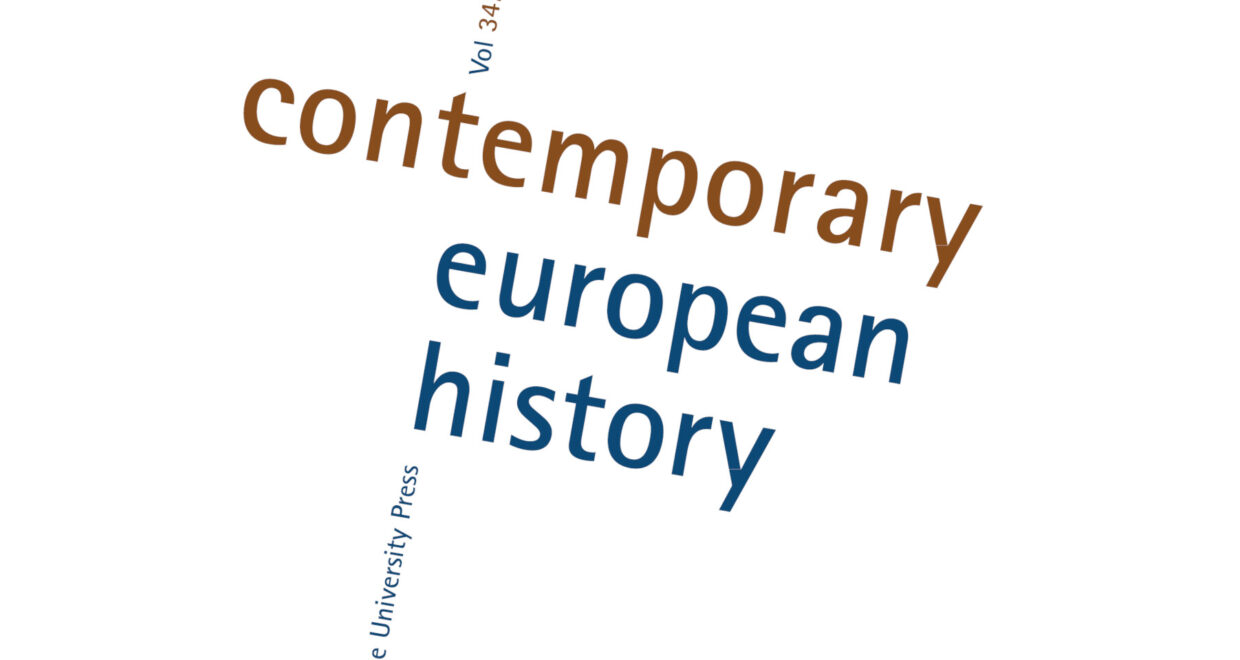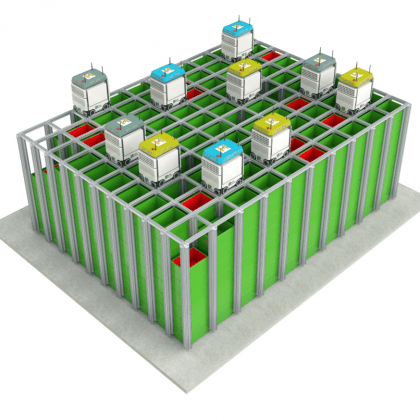Contemporary European History digest, no. 1, January to July 2025
As we – like many other journals – transition towards digital-only publication, we have become acutely aware of how difficult it can be to find out what is happening with Contemporary European History. The days of going to a university library and browsing a journal table of contents are long gone (and, indeed, our journal will no longer appear in print from 2026).
To make up for this, we are launching a new online “digest”, which will appear at regular intervals. Its purpose is to share with our readers the latest news about the journal and highlight some of the outstanding scholarship we have been publishing.
Please do let us know what you think of the digest – and thank you for your continued support!
Journal news
- We’re pleased to announce that, as of 2 July 2025, authors publishing in Contemporary European History are eligible for full open-access, regardless of their institutional affiliation. To find out more, read the dedicated FAQ for open-access.
- Sadly, the print copy of the journal will no longer be available from 2026 onwards.
- Also in 2026, will be moving towards digital-only continuous publication. There will no longer be quarterly issues of the journal; instead, articles will appear online as soon as they are published, with special issues, forums and roundtables organised into “collections”. As always, our latest articles are available on the journal website.
Our prize-winner!
Congratulations to James Nealy on the publication of his outstanding article, ‘The Shchekino Method: Flexible Production with Socialist Characteristics’, which won the 2023 Contemporary European History Prize.
Our former editor Quinn Slobodian said: “Nealy’s richly researched and analytically incisive study traces the unlikely emergence of a Soviet model of flexible labor management in the chemical industry, originating in the 1967 “Shchekino Experiment.” It challenges enduring Cold War binaries by showing how Soviet industrial reforms under Kosygin paralleled capitalist strategies of labor rationalization, cross-training, and efficiency incentives typically associated with post-Fordist economies. With remarkable archival depth and conceptual clarity, Nealy reveals how practices like job combination, labor norming, and wage fund stabilization laid the groundwork for systemic transformations in both late socialism and post-Soviet capitalism. The article not only offers a fresh reading of Soviet economic history but also contributes to global debates on the convergence of socialist and capitalist production regimes. It is a model of economic and social history at its most ambitious and illuminating.”
Featured articles
For each digest, editors are asked to highlight a published article on which they have particularly enjoyed working over the past few months. These are entirely personal choices, but hopefully they give an idea of the kind of work we have been publishing recently!
Emile Chabal chose Keely Stauter-Halsted’s article ‘Negotiated Filtration: The Surprising Fate of Poland’s Postimperial Civil Servants’, which is part of a special issue entitled ‘Navigating Post-Imperial Transitions after the First World War’
Emile said: “What happens to a bureaucracy when the state to which it belongs ceases to exist? This question, which has a wide applicability across different historical contexts, lies at the heart of this beautifully written examination of civil servants in the Polish lands after the collapse of the Habsburg and Ottoman empires. Stauter-Halsted tells the stories of state officials caught in the complex post-imperial space of East-Central Europe in 1918: how they responded, how they adapted their claims, how they reshaped their belonging in public and in private. Mixing micro and macrohistory, this terrific article tells us an awful lot about how states change (and how they don’t).”
Michelle Kahn chose Annalisa Martin’s article, ‘Prostitution as Profession: Histories of ‘Work-Shy’ Labour in a Welfare State, West Germany between 1949 and 1974’, which is part of a special issue entitled ‘Not-Working in Western Europe, 1950-2000: Practices, Policies, and Experiences’.
Michelle said: “Martin’s article compellingly examines commercial sex as an unrecognized form of labour that challenged the boundaries of what was considered ‘work.’ Although commercial sex was legal in West Germany, women who sold sex continued to be viewed as engaging in ‘asocial,’ ‘work-shy,’ or ‘vagrant’ behavior, the latter of which was a crime until 1974. Accordingly, many women who sold sex were excluded from state welfare programs or targeted by local police, health departments, or welfare agencies. By reconstructing the women’s working worlds in bars, in backrooms, and on the streets, Martin makes an important case for the need to consider prostitution as a legitimate profession in both the past and the present.”
Siobhán Hearne chose Tereza Juhászová’s article ‘Teachers in Power: Nation-Building and Loyalty in a Czechoslovak Periphery (1918–1947)’.
Siobhán said: “In this article, Juhászová lucidly presents the complexities of life in the multilingual and multiethnic borderlands of Central Europe in the first half of the twentieth century. Focusing on the career of Oldřich Taufer—a Czech school principal who lived and worked in the predominantly German- and Hungarian-speaking town of Nižný Medzev in eastern Slovakia—she aptly demonstrates how schools became contested sites of power and ideology against the backdrop of wars and regime change. Juhászová’s focus on ‘actors and regions on the margins of state attention’ shows us how ordinary schoolteachers navigated political upheavals, became central to nation-building efforts, and remained in post across regimes because they were equipped with unique skills that were in demand by the powers that be.”
Lauren Stokes chose Dónal Hassett’s Spotlight article ‘Rethinking the Colonial in the Great War’.
Lauren said: “Hassett provides an incisive overview of a scholarly field that has grown to daunting proportions, especially since the officially commemorated Centenary of the First World War and its associated publication boom. Hassett examines how the ‘Greater War’ paradigm has already broadened our understanding of the conflict and argues that a more sustained attention to the colonial dimensions has the potential to better clarify key categories like “veteran,” “paramilitary,” and even “war” itself.”
Nikolaos Papadogiannis chose Harry Legg’s article ‘I Hid for Days in the Basement’: Moments of ‘Jewish’ Discovery in Pre-Holocaust Germany and Austria’.
Nikolaos said: “Legg explores the moment when people ignorant of their Jewish heritage find out about the latter under dramatic circumstances in the context of National Socialism and before the Holocaust. The author builds on the autobiographical narrations of forty Germans and Austrians about their lives in the early 20th century to highlight the complexities of this hitherto understudied moment of discovery in the years before the Holocaust, like how antisemites responded to becoming the object of their own hatred.
Steph Wright has selected Claire Nally’s ‘“Death is Not the End”: Thanatology Today’.
Steph said: “Nally offers an impressive synthesis of the emerging field of death studies. This includes an incisive yet accessible appraisal of Bloomsbury’s new six-volume Cultural History of Death—which covers a historical time-span of 2500 years—as well as two highly innovative texts from the fields of necropolitics and cultural anthropology. Nally unpacks with ease such complex ideas as Hugo Ka Canham’s ‘riotous deathscape’, as well as Anne Allison’s discussion of Japan’s shifting cultures of death. In particular, Nally underscores how ‘the intersection of death studies and technology has profound implications for how we think about grief’.
Congratulations to all the other authors whose excellent work has been published in the journal in recent months – we are proud to host some of the best scholarship in the field!
The Contemporary European History editorial team
15 July 2025






